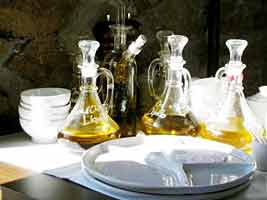Eating Well

Fats and Oils
PSA Rising, September 25 , 2003. Compounds in fat affect hormones and cause chemical changes that may either protect against cancer or make tumors grow.
Although many large population studies have found no links between total fat intake and increased risk for this cancer, researchers suspect that high fat diets may promote prostate, colorectal, pancreas, and breast cancer.
For prostate cancer the risk arises because in men, fatty body tissue synthesizes small amounts of testosterone and related hormones. These play roles in fueling prostate cancer.
In more detail, the influence of fat on prostaglandins and leukotrienes has been suggested as a mechanism by which dietary fats influence the start of cancer. Enzymes that metabolize arachidonic acid are emerging as "significant mediators of growth stimulation" for epithelial cancers including prostate cancer.
Polyunsaturated fatty acids may enhance tumor growth not only by promoting cell proliferation but also by suppressing apoptosis, the process by which, normally, damaged cells die off.
So both the amount and the type of fat consumed may count. Animal research and some population studies suggest that polyunsaturated fats increase risk. Monounsaturated fats may be protective.
- Polyunsaturated fats are found in safflower, sunflower, corn, and cottonseed oils.
- Monounsaturated fats are in olive, canola, and peanut oils and most nuts.
Hydrogenated and Partially Hydrogenated Fats
Polyunsaturated fats are unstable, and go rancid at room temperature. To stop this, food manufacturers add hydrogen molecules to the fat, a process known as hydrogenation.
This converts the fats into trans-fatty acids, which are used in margarine and vegetable shortening and any foods cooked or prepared with these fats, from French fries, doughnuts, pie crust, muffins and other bakery goods to peanut butter and snack foods. Trans-fatty acids are thought to be bad for the heart and may also be a factor in prostate cancer.
Update: In the USA, food manusfacturers must now (2006) label packaged foods with trans-fatty acid content. Fast foods and any foods prepared in restaurants may still contain unlabelled trans-fatty acids.
Olive Oil
Olive oil, used sparingly, is probably safe. And it makes vegetables, which are so good for you, more appetizing and brings out the lycopene in tomatoes.
| BASIC FATTY ACIDS | ||
| Type | Source | |
| Saturated | Animal products, both meat and dairy. Some tropical oils - palm, coconut, cocoa butter. | |
| Poly-unsaturated | Safflower, sunflower, corn, soybean and cottonseed oils. | |
| Mono-unsaturated | Olive, canola and peanut oil, most nuts. | |
| ESSENTIAL FATTY ACIDS | ||
| Type | Source | |
| Omega-3 fatty acids
Alpha-linolenic acid Converted to eicosapolyenoic acids including arachidonic acid which are the precursors of prostaglandins, thromboxanes and leukotrienes. |
Flaxseed, canola oil, soybeans, olive oil, many nuts (e.g. walnuts, peanuts, almonds, filberts), purslane (a green leafy veggie that grows like a weed). | |
| Docosa- hexaneoic acid & eicosa- pentaneoic acid |
Human milk and oily fish - mackerel, tuna, salmon, herring, trout, cod (and cod liver oil) sardines, bluefish. | |
| Omega-6 fatty acids
Linoleic (linolic) acid converted to eicosapolyenoic acids including arachidonic acid, which are the precursors of prostaglandins, thromboxanes and leukotrienes. |
Some vegetable oils, such as soybean and canola. Flaxseed. | |
| Omega-9 fatty acids | Olive oil. | |
| TRANS-FATTY ACIDS | ||
| Source | ||
Stick margarine and hardened packaged margarine (not soft or liquid margarine). Many packaged and prepared foods contain hydrogenated or partially hydrogenated oils. Watch out for cookies, cakes and pie crusts, salad dressings and some commercial breakfast cereals. Most commercial brands of peanut butter are hydrogenated (health store brands may be unhydrogenated). Most packaged breads (white, rye, oatmeal, wholewheat) include some hydrogenated vegetable oil. This chart draws on information in The Scientific American. Page content compiled and edited by J. Strax. Update: Sept 2003: Trans Fats, "like plastic," to be labelled in packaged foods. |
||

